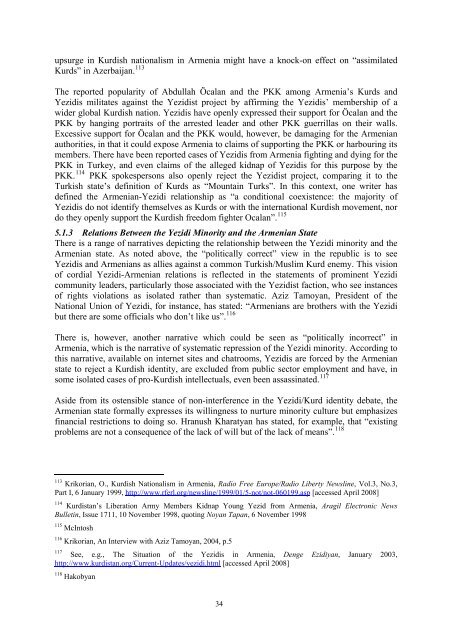The Human Rights situation of the Yezidi minority - UNHCR
The Human Rights situation of the Yezidi minority - UNHCR
The Human Rights situation of the Yezidi minority - UNHCR
Create successful ePaper yourself
Turn your PDF publications into a flip-book with our unique Google optimized e-Paper software.
upsurge in Kurdish nationalism in Armenia might have a knock-on effect on “assimilated<br />
Kurds” in Azerbaijan. 113<br />
<strong>The</strong> reported popularity <strong>of</strong> Abdullah Öcalan and <strong>the</strong> PKK among Armenia’s Kurds and<br />
<strong>Yezidi</strong>s militates against <strong>the</strong> <strong>Yezidi</strong>st project by affirming <strong>the</strong> <strong>Yezidi</strong>s’ membership <strong>of</strong> a<br />
wider global Kurdish nation. <strong>Yezidi</strong>s have openly expressed <strong>the</strong>ir support for Öcalan and <strong>the</strong><br />
PKK by hanging portraits <strong>of</strong> <strong>the</strong> arrested leader and o<strong>the</strong>r PKK guerrillas on <strong>the</strong>ir walls.<br />
Excessive support for Öcalan and <strong>the</strong> PKK would, however, be damaging for <strong>the</strong> Armenian<br />
authorities, in that it could expose Armenia to claims <strong>of</strong> supporting <strong>the</strong> PKK or harbouring its<br />
members. <strong>The</strong>re have been reported cases <strong>of</strong> <strong>Yezidi</strong>s from Armenia fighting and dying for <strong>the</strong><br />
PKK in Turkey, and even claims <strong>of</strong> <strong>the</strong> alleged kidnap <strong>of</strong> <strong>Yezidi</strong>s for this purpose by <strong>the</strong><br />
PKK. 114 PKK spokespersons also openly reject <strong>the</strong> <strong>Yezidi</strong>st project, comparing it to <strong>the</strong><br />
Turkish state’s definition <strong>of</strong> Kurds as “Mountain Turks”. In this context, one writer has<br />
defined <strong>the</strong> Armenian-<strong>Yezidi</strong> relationship as “a conditional coexistence: <strong>the</strong> majority <strong>of</strong><br />
<strong>Yezidi</strong>s do not identify <strong>the</strong>mselves as Kurds or with <strong>the</strong> international Kurdish movement, nor<br />
do <strong>the</strong>y openly support <strong>the</strong> Kurdish freedom fighter Ocalan”. 115<br />
5.1.3 Relations Between <strong>the</strong> <strong>Yezidi</strong> Minority and <strong>the</strong> Armenian State<br />
<strong>The</strong>re is a range <strong>of</strong> narratives depicting <strong>the</strong> relationship between <strong>the</strong> <strong>Yezidi</strong> <strong>minority</strong> and <strong>the</strong><br />
Armenian state. As noted above, <strong>the</strong> “politically correct” view in <strong>the</strong> republic is to see<br />
<strong>Yezidi</strong>s and Armenians as allies against a common Turkish/Muslim Kurd enemy. This vision<br />
<strong>of</strong> cordial <strong>Yezidi</strong>-Armenian relations is reflected in <strong>the</strong> statements <strong>of</strong> prominent <strong>Yezidi</strong><br />
community leaders, particularly those associated with <strong>the</strong> <strong>Yezidi</strong>st faction, who see instances<br />
<strong>of</strong> rights violations as isolated ra<strong>the</strong>r than systematic. Aziz Tamoyan, President <strong>of</strong> <strong>the</strong><br />
National Union <strong>of</strong> <strong>Yezidi</strong>, for instance, has stated: “Armenians are bro<strong>the</strong>rs with <strong>the</strong> <strong>Yezidi</strong><br />
but <strong>the</strong>re are some <strong>of</strong>ficials who don’t like us”. 116<br />
<strong>The</strong>re is, however, ano<strong>the</strong>r narrative which could be seen as “politically incorrect” in<br />
Armenia, which is <strong>the</strong> narrative <strong>of</strong> systematic repression <strong>of</strong> <strong>the</strong> <strong>Yezidi</strong> <strong>minority</strong>. According to<br />
this narrative, available on internet sites and chatrooms, <strong>Yezidi</strong>s are forced by <strong>the</strong> Armenian<br />
state to reject a Kurdish identity, are excluded from public sector employment and have, in<br />
some isolated cases <strong>of</strong> pro-Kurdish intellectuals, even been assassinated. 117<br />
Aside from its ostensible stance <strong>of</strong> non-interference in <strong>the</strong> <strong>Yezidi</strong>/Kurd identity debate, <strong>the</strong><br />
Armenian state formally expresses its willingness to nurture <strong>minority</strong> culture but emphasizes<br />
financial restrictions to doing so. Hranush Kharatyan has stated, for example, that “existing<br />
problems are not a consequence <strong>of</strong> <strong>the</strong> lack <strong>of</strong> will but <strong>of</strong> <strong>the</strong> lack <strong>of</strong> means”. 118<br />
113 Krikorian, O., Kurdish Nationalism in Armenia, Radio Free Europe/Radio Liberty Newsline, Vol.3, No.3,<br />
Part I, 6 January 1999, http://www.rferl.org/newsline/1999/01/5-not/not-060199.asp [accessed April 2008]<br />
114 Kurdistan’s Liberation Army Members Kidnap Young Yezid from Armenia, Aragil Electronic News<br />
Bulletin, Issue 1711, 10 November 1998, quoting Noyan Tapan, 6 November 1998<br />
115 McIntosh<br />
116 Krikorian, An Interview with Aziz Tamoyan, 2004, p.5<br />
117 See, e.g., <strong>The</strong> Situation <strong>of</strong> <strong>the</strong> <strong>Yezidi</strong>s in Armenia, Denge Ezidiyan, January 2003,<br />
http://www.kurdistan.org/Current-Updates/yezidi.html [accessed April 2008]<br />
118 Hakobyan<br />
34
















